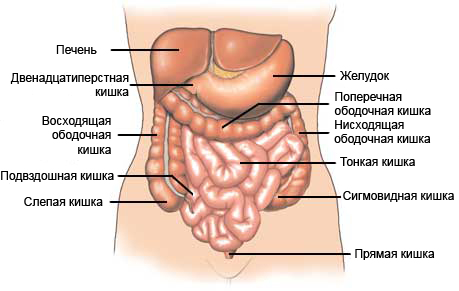Antibiotic-associated colitis
Description of antibiotic-associated colitis
Antibiotic assotsiirovannыy colitis – inflammation of the colon due to infection. Often there is diarrhea and abdominal cramps. Infection can cause severe consequences.

Causes antibiotic-associated colitis
In the large intestine live beneficial bacteria to the body. The course of treatment with antibiotics often kill all the good bacteria in the gut. This creates an ideal environment for the bacteria Clostridium difficile, which are not killed by antibiotics, and begin to multiply uncontrollably. Proliferation of bacteria leads to inflammation and irritable bowel. Clostridium difficile produces toxins, which damage the walls of the intestine.
Risk factors
Factors, which increase the risk of antibiotic-associated colitis:
- Use of antibiotics;
- Age: elderly;
- Prolonged hospitalization or treatment;
- Serious illness.
Other possible risk factors include:
- Enteroalimentation;
- Medication, lowering gastric acidity;
- Gastrointestinal Surgery (stomach or bowel surgery ) or gastrointestinal diseases, such as Crohn's disease or ulcerative colitis;
- Pregnancy;
- Chemotherapy;
- Bone marrow transplantation.
Symptoms of antibiotic colitis
These symptoms may be caused by other diseases. When they appear, you must consult a doctor to clarify the diagnosis. Symptoms may include:
- Loose stools;
- Watery diarrhea;
- Abdominal pain;
- Fever;
- Nausea and vomiting (rarely);
- Dehydration;
- Low blood pressure.
Diagnosis of antibiotic-assed colitis
The doctor asks about the symptoms and medical history, and performs a physical exam. Tests may include:
- Fecal – to identify toxins, produced by bacteria;
- CT scan – X-ray, which uses computer, to take pictures inside the body;
- Colonoscopy – special tool (endoscope) Enter through the rectum to examine the cover of the large intestine.
Treatment of antibiotic-assed colitis
Treatment options include the following:
Reimbursement of liquids
The first step – termination of antibiotics and reimbursement of lost fluid. Before stopping antibiotics, you must consult a doctor. Colitis usually takes place within two weeks after the abolition of antibiotics.
Medication
The patient is prescribed antibiotics, who kill Clostridium difficile. You can also take probiotics, which help restore the normal level of beneficial bacteria in the intestines.
It is not recommended to use antidiarrheal drugs (eg, Loperamid and opiates).
Operation
In very rare cases, the operation may be needed. The surgeon can remove the small intestine through the hole in the abdominal cavity. In this case, the chair will be given, Passing the large intestine and rectum. This operation is called ileostomy.
The surgeon can also remove the colon. This operation is called colopetomy.
Prevention of antibiotic-assed colitis
The best way to prevent this disease – Reducing the use of antibiotics. Antibiotics should only be used when the doctor confirmed the presence of a bacterial infection.
When prescribing antibiotics, you need to ask the doctor about the possibility of taking probiotics, which help restore beneficial bacteria in the intestines.
